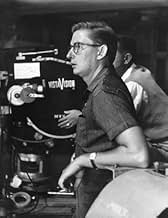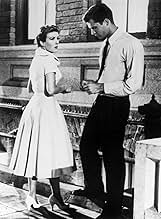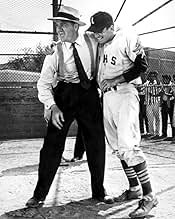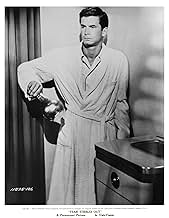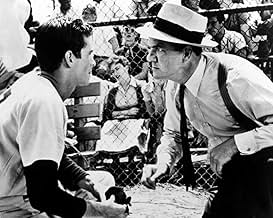IMDb रेटिंग
6.9/10
2.3 हज़ार
आपकी रेटिंग
अपनी भाषा में प्लॉट जोड़ेंTrue story of the life of Jimmy Piersall, who battled mental illness to achieve stardom in major league baseball.True story of the life of Jimmy Piersall, who battled mental illness to achieve stardom in major league baseball.True story of the life of Jimmy Piersall, who battled mental illness to achieve stardom in major league baseball.
- पुरस्कार
- कुल 1 नामांकन
John Aberle
- Ballplayer
- (बिना क्रेडिट के)
Eric Alden
- Policeman
- (बिना क्रेडिट के)
Heather Ames
- Nurse
- (बिना क्रेडिट के)
Sam Balter
- Broadcaster
- (वॉइस)
- (बिना क्रेडिट के)
Mary Benoit
- Nurse
- (बिना क्रेडिट के)
John Benson
- Reporter
- (बिना क्रेडिट के)
Don Brodie
- Reporter Evans
- (बिना क्रेडिट के)
Richard Bull
- Reporter Slade
- (बिना क्रेडिट के)
Bart Burns
- Joe Cronin
- (बिना क्रेडिट के)
Edd Byrnes
- Boy in Car Assisting Jimmy Up Stairway
- (बिना क्रेडिट के)
Wade Cagle
- Intern
- (बिना क्रेडिट के)
Keith Coyne
- Baby
- (बिना क्रेडिट के)
फ़ीचर्ड समीक्षाएं
FEAR STRIKES OUT dealt with a theme not often portrayed in films of the '50s--mental illness--and is a shattering example of how a father's insistence on perfection can have a significant effect on the well being of a sensitive individual unable to meet his father"s expectations. Marketed at time of release as a baseball movie, it's really a relationship movie about a father and son--that is the real heart and soul of the story.
Based on the real life story of Jim Piersall, a well known American sports figure for the Boston Red Sox, as taken from his own account of his life. Slowly the picture emerges of the kind of stress he was under to achieve his goal of playing in the majors, the kind of guilt he felt whenever he did something that aggravated his father--as in simple disobedience when he didn't come straight home after work and then broke his ankle at an ice skating rink.
Even in the midst of achievements, his father finds flaws to criticize. "Wish me luck," he pleads with his father when the Red Sox signs him. "No, luck won't do it. You've got to be thinking and planning all the time."
And later on in the film, after his breakdown and he lands in a mental asylum, he defends his father to his psychiatrist with, "If it hadn't been for him pushing me and driving me, I wouldn't be where I am today!" Chilling words and the scene is the turning point in Piersall's progress toward recovery and the root cause of his problems.
It's the sort of film everyone can relate to, sports minded or not, because it does reveal the danger of parents who expect too much from their children, with tragic results. The scene where Malden tries to take him from the hospital before he's ready to go, is a chiller.
Both ANTHONY PERKINS and KARL MALDEN give the kind of performances that merited at least Oscar nominations--solid and superb.
Summing up: A satisfying, mature drama that takes a penetrating look at the danger of pressure-driven father/son relationships in the sports world where winning is the only thing that counts.
Based on the real life story of Jim Piersall, a well known American sports figure for the Boston Red Sox, as taken from his own account of his life. Slowly the picture emerges of the kind of stress he was under to achieve his goal of playing in the majors, the kind of guilt he felt whenever he did something that aggravated his father--as in simple disobedience when he didn't come straight home after work and then broke his ankle at an ice skating rink.
Even in the midst of achievements, his father finds flaws to criticize. "Wish me luck," he pleads with his father when the Red Sox signs him. "No, luck won't do it. You've got to be thinking and planning all the time."
And later on in the film, after his breakdown and he lands in a mental asylum, he defends his father to his psychiatrist with, "If it hadn't been for him pushing me and driving me, I wouldn't be where I am today!" Chilling words and the scene is the turning point in Piersall's progress toward recovery and the root cause of his problems.
It's the sort of film everyone can relate to, sports minded or not, because it does reveal the danger of parents who expect too much from their children, with tragic results. The scene where Malden tries to take him from the hospital before he's ready to go, is a chiller.
Both ANTHONY PERKINS and KARL MALDEN give the kind of performances that merited at least Oscar nominations--solid and superb.
Summing up: A satisfying, mature drama that takes a penetrating look at the danger of pressure-driven father/son relationships in the sports world where winning is the only thing that counts.
This is not what one would call a pleasant film to watch particularly about Baseball. It tells the true story of former major league ball player Jim Piersall of the Boston Red Sox and his eventual mental breakdown. While certain events are not exactly the way they took place the story nonetheless sticks pretty much to fact. Anthony Perkins puts in a dynamic performance as Piersall. A kid who likes baseball but is driven to madness by his domineering perfection minded father played by Karl Malden. Also included in the cast is Norma Moore as Jims devoted wife Mary and Adam Williams as the psychiatrist Doctor Brown.
The first half of the picture deals with Piersall growing up practicing and playing baseball always under the scrutiny of his father. Whatever Jim did on the playing field it could always have been done better according to his Dad. The second half of the film deals with Piersalls mental breakdown and subsequent treatment and recovery. While watching a ball game on TV he makes remarks that his doctor picks up on and uses to unlock the reason why he cracked up. These same circumstances are no doubt still occurring today as many parents push their children relentlessly in everything from sports to academics to beauty pageants. Jim Piersalls story fortunately became a book and later this fine film that perhaps has and will continue to serve as a message to those who watch it. Whether you're a baseball fan or not this is a movie to be seen.
The first half of the picture deals with Piersall growing up practicing and playing baseball always under the scrutiny of his father. Whatever Jim did on the playing field it could always have been done better according to his Dad. The second half of the film deals with Piersalls mental breakdown and subsequent treatment and recovery. While watching a ball game on TV he makes remarks that his doctor picks up on and uses to unlock the reason why he cracked up. These same circumstances are no doubt still occurring today as many parents push their children relentlessly in everything from sports to academics to beauty pageants. Jim Piersalls story fortunately became a book and later this fine film that perhaps has and will continue to serve as a message to those who watch it. Whether you're a baseball fan or not this is a movie to be seen.
This a very interesting, but not totally factual, account of the life of Jimmy Piersall. Piersall was a popular player with the Boston Red Sox. His antics on and off the field are now legendary. Piersall fell in love with baseball at a young age, but his domineering father forced Jimmy to not only achieve, but to play to perfection. Mr. Piersall's constant manipulating can be traced to his son's mental breakdown.
Anthony Perkins puts in a dedicated performance as Jimmy Piersall. Karl Malden excelled as the relentless Mr. Piersall. Also in the cast are Bart Burns, Norma Moore and Adam Williams.
This is a very stark and interesting movie, just don't take all the content as gospel. A baseball fan's delight.
Anthony Perkins puts in a dedicated performance as Jimmy Piersall. Karl Malden excelled as the relentless Mr. Piersall. Also in the cast are Bart Burns, Norma Moore and Adam Williams.
This is a very stark and interesting movie, just don't take all the content as gospel. A baseball fan's delight.
If this story were filmed today, the treatment would be much more stark and realistic. But for a film in the mid-50s, it provided quite a punch in conveying the agony of growing up with a loving but very demanding father. When I saw it in the theater, I never questioned Anthony Perkins as a teenager in the first part; today, this is much more difficult to swallow. Even though dated somewhat, the film is still worth a watch.
Karl Malden is excellent as a father driven by his own sense of failure to attempt to live vicariously through his son. As a result, he literally orchestrates his son's life. Never accepting the `glory' of the moment, he places constant expectations and demands on his son. Possibly this is Malden's best role.
Tony Perkins has some fine moments of anguish and neuroticism as the ball player, Jimmy Piersall. One scene between his father and him after his breakdown is superbly acted with Perkins running through a panoply of emotions. That this emotional turmoil is somewhat subdued is to the credit of the film. Norma Moore gives a competent and rather understated performance as his wife. The doctor, played by Adam Williams, is appropriately comforting, but he's not up to delivering the big line, especially in his intense scene with Malden. Regretfully, Perry Wilson as Piersall's submissive mother, didn't have more of a role.
Some very nice photography using the angularity of steps and bleachers and railroad stations conveys the underlying jaggedness and tension of emotions. Elmer Bernstein's soundtrack is effective in supporting the mood of the film.
Karl Malden is excellent as a father driven by his own sense of failure to attempt to live vicariously through his son. As a result, he literally orchestrates his son's life. Never accepting the `glory' of the moment, he places constant expectations and demands on his son. Possibly this is Malden's best role.
Tony Perkins has some fine moments of anguish and neuroticism as the ball player, Jimmy Piersall. One scene between his father and him after his breakdown is superbly acted with Perkins running through a panoply of emotions. That this emotional turmoil is somewhat subdued is to the credit of the film. Norma Moore gives a competent and rather understated performance as his wife. The doctor, played by Adam Williams, is appropriately comforting, but he's not up to delivering the big line, especially in his intense scene with Malden. Regretfully, Perry Wilson as Piersall's submissive mother, didn't have more of a role.
Some very nice photography using the angularity of steps and bleachers and railroad stations conveys the underlying jaggedness and tension of emotions. Elmer Bernstein's soundtrack is effective in supporting the mood of the film.
I don't find movies about illnesses whether they are physical or mental, real or fictitious, to be entertaining, maybe informative or educational, so I am approaching my criticism of this movie from the baseball aspect. Jimmy Piersall was quite a character. He overcame a mental breakdown to become one of the greatest outfielders in baseball history. He was a real crowd pleaser with his fielding and antics, but his hitting left a lot to be desired. He just about ruined his arm showing off how far and hard he could throw the ball. When he hit his 100th homerun, he ran the bases backwards. Living near Boston, I saw him play ball on many occasions and I met him in person at a First National Supermarket opening in Lawrence, Mass. He signed a baseball and a photograph of himself for me, but I had to buy two bags of potato chips (Cains, I think it was) beforehand. As a kid, I could barely afford it, but more than fifty years later, I still have the ball and photo. What a thrill it was! I remember him as being handsome and big and strong, not a skinny guy like Anthony Perkins. As far as the movie goes, it was good, but not very accurate. Did you notice the obvious padding to Perkin's shoulders to make him look bulky? He looked like he never played baseball in real life, he was so awkward. (Gary Cooper as Lou Gehrig and William Bendix as Babe Ruth also looked pretty bad in their baseball movies). Did you notice that the stock footage was of Fenway Park but whenever Perkins was playing they showed some minor league park? Just look at the outfield background, that's not Fenway. What really bothers me is that they only mention one real life Red Sox person, Joe Cronin, and that was wrong, it should have been Pinky Higgins. What happened to Ted Williams, Jackie Jensen (my all time favorite Red Sox player), Dom Dimaggio, Bobby Doerr, Johnny Pesky, and a bunch of others who played on the team with Piersall? Ted's career was actually extended because Piersall was so good as a fielder that he used to run from center to left to catch flyballs so that Williams didn't have to tire himself out trying to get to them. Piersall was eventually traded to another team, so all his euphoria about playing for the Bosox didn't last. Still with all its' faults and disappointments, this movie is well worth watching, especially for baseball fans.
क्या आपको पता है
- ट्रिवियाThe real Jimmy Piersall disowned the movie due to its distortion of the facts. Based on the success of his autobiography and the movie, Piersall penned a second book in 1985 called The Truth Hurts, which detailed his ousting from the White Sox organization.
- गूफ़Close-up shots of Jimmy Piersall playing shortstop and right field reveal a low outfield wall backed by trees in the background. These games were supposed to be in Fenway Park, which would have a high left field wall and bleachers in right field.
- भाव
Jim Piersall: I don't care what happens. I love you Mary!
- कनेक्शनFeatured in Diamonds on the Silver Screen (1992)
टॉप पसंद
रेटिंग देने के लिए साइन-इन करें और वैयक्तिकृत सुझावों के लिए वॉचलिस्ट करें
- How long is Fear Strikes Out?Alexa द्वारा संचालित
विवरण
- रिलीज़ की तारीख़
- कंट्री ऑफ़ ओरिजिन
- भाषा
- इस रूप में भी जाना जाता है
- The Jim Piersall Story
- फ़िल्माने की जगहें
- उत्पादन कंपनी
- IMDbPro पर और कंपनी क्रेडिट देखें
- चलने की अवधि
- 1 घं 40 मि(100 min)
- रंग
- पक्ष अनुपात
- 1.85 : 1
इस पेज में योगदान दें
किसी बदलाव का सुझाव दें या अनुपलब्ध कॉन्टेंट जोड़ें


